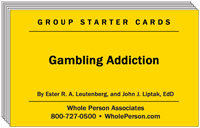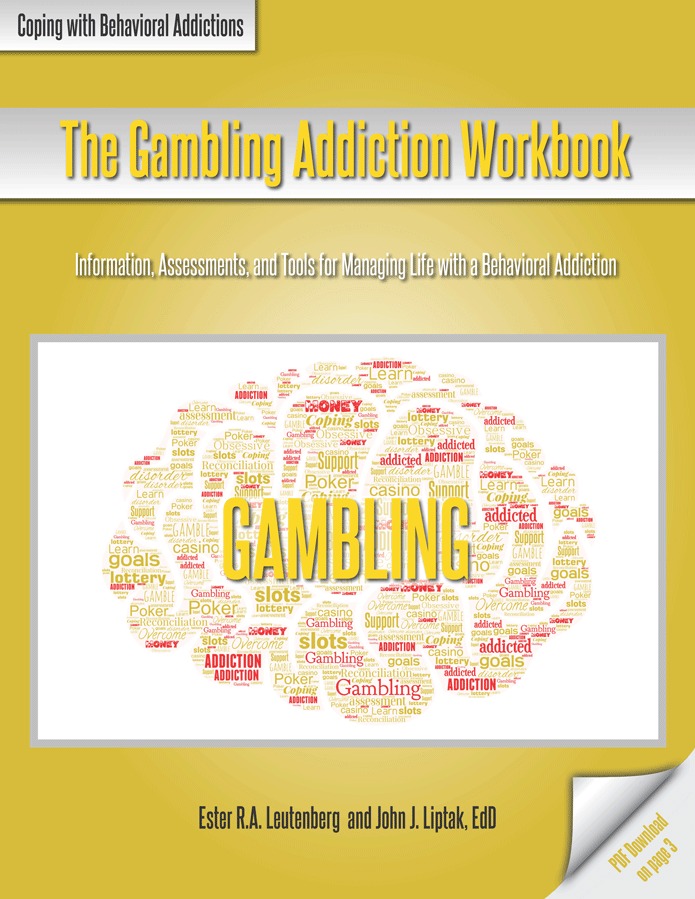Gambling Addiction
Gambling addiction‒also known as pathological gambling, compulsive gambling, or gambling disorder - is an impulse-control disorder. Compulsive gamblers struggle to control the impulse to gamble, even when it has negative consequences for them or their loved ones. They will tend to gamble whether they are winning, losing, broke, or ahead financially. They keep gambling regardless of the consequences, even when they know the odds are against them or they cannot afford to lose. Gambling problems vary in intensity. People who are addicted can also have a gambling problem without being totally out of control. Gambling addiction or gambling disorder is defined: persistent and recurring problematic gambling behavior that causes distress and impairs your overall livelihood.
The Gambling Addiction Workbook aims to provide helping professionals with cognitive and behavioral assessments, tools, and exercises to treat the root psychological causes of gambling addiction. It is designed to help people identify and change negative, unhealthy thoughts and behaviors that may have led to gambling addiction. The activities contained in this workbook can help participants identify the triggers that lead to gambling and teach them ways to overcome and manage those triggers.
The Gambling Addiction Workbook will help participants to:
- Recognize that they are experiencing an addiction problem.
- Reflect and become aware of the behaviors that were part of and arose from the addiction.
- Build self-esteem in positive capabilities outside of gambling.
- Understand the triggers for preoccupation with gambling.
- Develop greater self-acceptance and the ability to change ineffective behaviors.
- Understand recurring patterns that indicate a gambling disorder.
- Learn ways to live a new life without the need to gamble.
The Gambling Addiction Workbook is a practical tool for therapists, counselors, and helping professionals in their work with people suffering from behavioral addictions. Depending on the person's role using this workbook and the specific group's or individual's needs, the modules can be used individually or as part of an integrated curriculum. Use one activity in a group or several assessments in a workshop.
The Five Modules
This workbook contains five separate modules of activity-based handouts that will help participants learn more about themselves and their gambling addiction. These modules serve as avenues for self-reflection and group experiences revolving around topics of importance in the lives of the participants in the group.
The activities in this workbook are user-friendly and varied to provide a comprehensive method of analyzing, strengthening, and developing characteristics, skills, and attitudes for overcoming an addiction to gambling.
All activities in this workbook are entirely reproducible and can be photocopied and/or revised for direct participant use.
Module 1: My Gambling History
This module helps participants explore their gambling history by examining family traditions, signs of gambling addiction, gambling habits, medical issues, social and emotional influencers, stressors that trigger the urge to gamble, and the plan for lasting change when addicted to gambling.
Module 2: Awareness of Gambling
This module helps participants explore awareness of their gambling problems by examining their destructive gambling patterns, the triggers that promote gambling, the emotions involved with gambling, the unrealistic thoughts that can promote gambling, and the destructive aspects of the denial of a gambling issue.
Module 3: Money Issues
This module helps participants examine the impact on their financial life by exploring the results of having to borrow and/or finance a gambling addiction, the ways they get their money, how much they typically spend, how a budget can help to reduce the urge to gamble, who enables them, and how they feed their gambling habit.
Module 4: Effects of Gambling
This module helps participants observe how gambling affects their life by investigating the effects of gambling on their occupational functioning, legal problems, financial difficulties, emotional issues, psychological problems, and relationships.
Module 5: Finding Healthy Alternatives
This module helps participants discover healthy ways to spend their time other than gambling by investigating healthy alternatives, managing their cravings, creating healthy habits, relying on supportive people, relaxing, helping others to help themselves, and developing hobbies to relieve boredom.
PDF Worksheets - With the purchase of this workbook, you also get access to a PDF download of the included worksheets.
 Gambling Addiction Card Deck
Gambling Addiction Card Deck
Using the Discussion Starter Card Deck will break the ice, encourage openness, and help introduce a specific subject. Activity handouts included in these workbooks are reflective, easy-to-use exercises, presented in a variety of formats to accommodate multiple intelligences and different learning styles. Each question corresponds to a page in the workbook.


